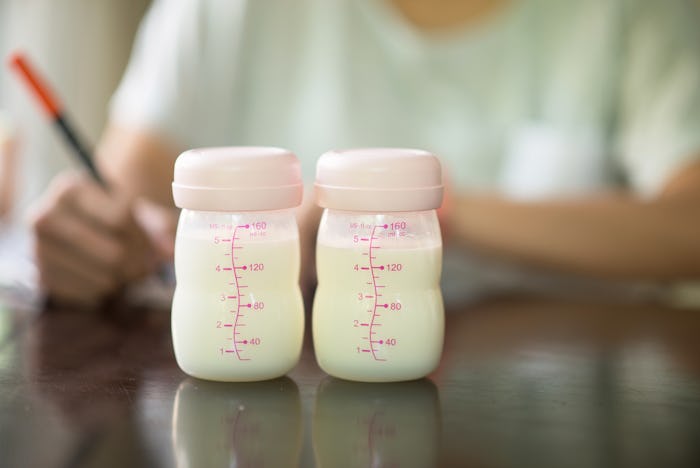Life

Oh The Colors Your Breast Milk Can (& Will) Be
The first time you see your expressed breast milk, you may be a bit surprised. If you've never pumped before or looked at your milk in a larger quantity, you might not know that breast milk can be a huge variety of colors — ranging pretty much over the whole color spectrum more or less. If you're wondering what color your breastmilk should be after seeing it in a bottle or freezer bag, you're not alone. Many moms are taken aback by the various colors that appear in their milk depending on when they pump.
Believe it or not, there is a pretty wide spectrum of colors when it comes to what's considered "normal" for breast milk. According to Very Well, typical breast milk colors can range from clear, white, off white, and blueish. However there are a few other colors that can make appearances in your milk as well.
Depending on what you eat, or any nutritional supplements or medications you may be taking, your milk may change colors as well. Very Well noted that these changes are usually diet-related and aren't a big deal. If you're eating a lot of greens foods, green dyes, or herbal supplements, your milk may take on a green-ish hue. Similarly, if you eat lots of pink, red, or orange tinted foods, your milk can change to match it as well.
Hindmilk and foremilk also has different tints to it, according to Breastfeeding Basics. Your foremilk will be lighter, clear, and more watery than the thicker, fuller fat hindmilk.
According to La Leche League International, brownish or black milk can be the result of prescription medication. And as strange as it sounds, as long as the medication is ok for nursing, your milk is just fine. Pink or reddish milk can indicate blood in the milk from cracked nippled — this is usually a sign of poor latch, according to LLLI and can be corrected with practice.
The Milk Bank assures mothers that the different colors in their milk are completely normal. Your milk may change from day to day, or even minute to minute — a testament to how closely your body works to produce the very best for your baby.